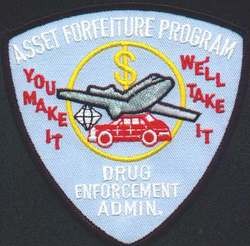When drug task forces in Missouri confiscate money and valuables during narcotics investigations, they keep about 80 percent of what they seize through a federal asset forfeiture program. They are supposed to document what that money is used for, whether it's new equipment, overtime, or other expenses.
However, the form they fill out is vague and the drug task forces themselves say they aren't sure where much of the money goes without the help of accountants to figure it out.
According to Southeast Missouri Drug Task Force 2013 asset forfeiture report, which was obtained by Aaron Malin of Show-Me Cannabis through a Missouri Sunshine request, more than $141,000 out of $204,991 in seized assets spent by the task force was put in the "other" category.
The only fully disclosed expenditures was $21,982 for "Overtime" and $41,157 for "Travel and training."
Categories such as "Communications and computers, "Weapons and protective gear," and other items were blank. But $141, 851 were placed in the undisclosed "Other."
Sergeant Mark McClendon of the SEMO task force tells Daily RFT that such a big chunk of money has to be placed in undisclosed category because the other categories aren't specific enough.
"Where would you place 'vehicles?'" he asked rhetorically. He's right. There's no proper section for vehicles, which was the biggest expense of the $141,851.
McClendon says the SEMO task force spent $80,000 on three trucks and $10,000 on a car.
About $15,000 was spent on "contractual stuff, an annual audit, and accounting fees," he adds.
And $12,000 was spent on special equipment McClendon says he could not disclose, including a "piece of equipment used for interdiction on the interstate" and another piece of equipment used to take data off cell phones during search warrants.
But that still left about $23,000 that was unaccounted for. McClendon says he didn't have any details on the rest of the money, but says it was used on "general supplies - things to keep the office running."
When Malin sent another Sunshine request last week to the SEMO task force, he was told that the information would cost hundreds of dollars to obtain.
See also: Asset Forfeiture Reform Activists Reignite Debate for Reform in Missouri
"It will take in the neighborhood of 2-3 hours to further detail the expenditures within the general 'other' category from page 3 of the equitable sharing report," McClendon writes in an email to Malin and reviewed by Daily RFT. "The accountant's hourly rate is $120.00 per hour. In addition, our Administrative officer would need to be involved and her hourly rate is $20.19. Basically we would break down our 'other' category into more detail. The total cost would be between $280.38 and $420.57."
For more info on seized assets and to see the report, click on the next page...
Southeast Missouri (SEMO) Drug Task Force Seized Asset Report (2013)
In a 2012 seized asset report, about $62,000 was listed in the "Other" category, less than half of the following year. Requests for information on this have been made, but McClendon tells Daily RFT it would require fees to pay for accountants to determine those expenditures.
The SEMO task force is not the only narcotics officers group in Missouri whose seized asset expenditures raise eyebrows of forfeiture reform activists. The MUSTANG drug task force - which works in Boone, Callaway, and Cole counties - spent $39,000 on "informants, 'buy money,' and rewards." Paying for informants and "buy money" is not illegal, but the ethical question is up for debate as it can lead to cases of entrapment, enticement, and sometimes paying money to the very people police are trying to put away.
Also, assets that police seize are supposed to go to a special fund for public schools, according to Missouri state law. However, police can bypass this law by putting seized assets into the federal forfeiture program, which gives the federal government 20 percent and allows police departments to keep the other 80 percent.
This is a normal practice for drug task forces and one that Kevin Glaser, the vice president of the Missouri Narcotics Officers Association, freely admits to doing because he believes the police departments would make better use of the funds than state lawmakers.
For asset forfeiture reform activists like Malin, this is unacceptable.
"SEMO spends the money they steal from the school fund on themselves -- overtime pay, travel and training, bigger guns -- and MUSTANG spends it on undercover buys, which are pretty unethical," he says.
Despite the apparent lack of transparency over how some of the seized asset funds are spent by drug task forces, it's an improvement over previous years when reports weren't even filed. In 2011, state auditor Tom Schweich said not a single audit had been submitted and complained that this had a negative effect on public school funding.
See also: MO Auditor Dings Cops for Missing Asset Forfeiture Reports - In Asset Forfeiture Cases Like the One at Camp Zoe, Feds Help Local Police Keep Money From Missouri Schools
Follow Ray Downs on Twitter:
E-mail him at [email protected].






